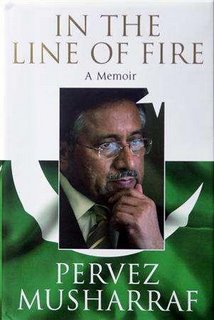
Despite its heavyweight theme, clichés and superfluity, it is written like a racy thriller. It starts with a violent beginning, a suicide attack on the President of Pakistan, and then like a flashback, portrays the journey of the man who was the target of the suicide attack.
At that time, when I started reading this book, I was between a novel and a political science book but the General’s opus wrested my attention so much that I had to keep everything aside. Even the eagerly awaited Bond flick Casino Royale had to wait for a week.
Every night I found myself delving deep into the world of this Delhi-born little Muslim boy who had migrated to Pakistan with his parents at the time of the sub-continent’s partition, who spent part of his childhood in Turkey, speaking a fluent Turkish like any other local Turkish boy of his age, was known as a dadageer (a bold, awe-inspiring person, more like a bully) amongst his peers, didn’t do as well in his studies as his bright elder brother and who ended up in the army. The boy turned into a soldier of promise who was destined to end the phase of “sham democracy” in Pakistan and save his country from the brink of disaster, from imploding as a failed state.
Too good to be true? But that's how the General has written his biography, which many have alluded to as "selective hagiography". At times, it looks like a justification palimpsest from this formidable ruler, who needs a crash course in humility; at others, it looks like his manifesto, especially the last few chapters of the book, on why Pakistan and the world needs him in the age of terror.
It makes sense, in a way. During the cold war, Pakistan was (still is) the ally state of USA in South Asia, a bulwark in the region. Now that China is emerging as the new super power, Pakistan is still useful as a bulwark state for China in an India-dominated region.
Hagiography or self-laudatory spiel, the book opens a window into the life of a military general, who once was in love with a Bengali girl, who rues over the unjust legacies from a painful partition, who broke down on the vivisection of Pakistan into Bangladesh and who vilifies India for her treacherous role in that separation.
Whatever the critics say, the book, it seems, has served its purpose. It is doing brisk business and his allies are impressed with his frankness, especially with the details of how he has played the role of a faithful ally in the war on terror.

No comments:
Post a Comment